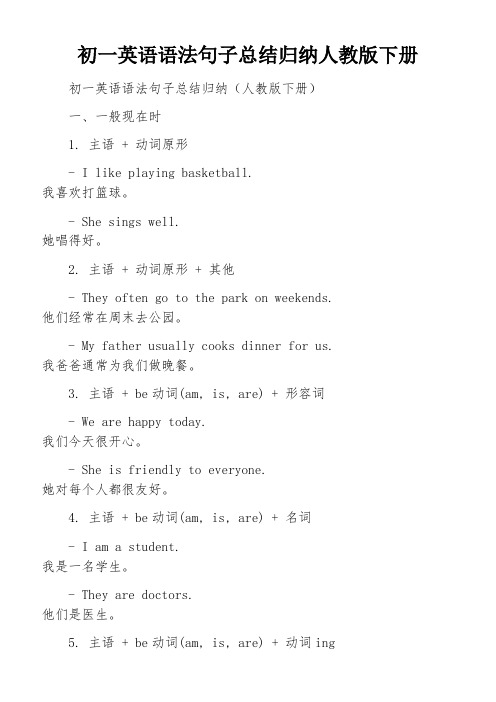初一下册一般将来时
- 格式:doc
- 大小:345.00 KB
- 文档页数:8



一般将来时知识点七年级一般将来时是英语语法的一部分,用于表示将来发生的动作或事件。
在七年级的学习中,学生们需要掌握一般将来时的用法,从而能够正确地表达未来的计划和想法。
本文将为你介绍一般将来时的知识点。
1.构成一般将来时由“will + 动词原形”构成,例如:I will study hard for the exam.我们也可以使用“be going to + 动词原形”来表达一般将来时,例如:She is going to visit her grandparents this weekend.2.用法(1)表示未来的计划和安排。
例如:We will have a picnic next Sunday.(2)表示预测或猜测。
例如:It will rain tomorrow.(3)表示意图、打算或决心。
例如:I will help you with your homework.(4)表示请求或提供帮助。
例如:Will you please lend me your pen?(5)表示愿望、要求或命令。
例如:I hope you will study hard.3.注意事项(1)will 通常用于第一人称和第二人称,而“be going to”通常用于第三人称。
例如:I will take the bus home.You will enjoy the party.He is going to buy a new car.(2)在口语中,我们可以缩略将来时形式。
例如:I'll call you later.We're going to the beach this weekend.(3)应该避免在句子中使用简单现在时代替将来时。
例如:Wrong: She flies to New York next week. Right: She will fly to New York next week.4.例子下面是一些使用一般将来时的例子:I will buy a new phone next month. Sandy is going to take French lessons.Will you go to the concert with me?They will have a party on Friday.I hope you will enjoy your vacation.总结在七年级的英语学习中,学生们需要掌握一般将来时的用法。


英语七年级下册人教版一般将来时和一般现在时两种时态笔记概念构成动词形式1.一般现在时(1)结构:当主语是第三人称单数时,谓语动词用第三人称单数形式。
(2)动词的第三人称单数形式变化规则如下:①直接加s。
如:work-works。
②以“辅音字母+y”结尾的词,先变y为i,再加es。
如:carry-carries;cry-cries;try-tries;study一studies。
③以s,x,o,ch,sh结尾的词加es。
如:wash-washes;teach-teaches;go-goes;pass一passes;fix-fixes。
④特殊:have has;am/are is(3)用法:①表示习惯性的动作。
常与seldom,often,usually,always,sometimes,today,every day,once a week,every five minutes,on Sundays等时间状语连用。
如:I go to school at seven every day.我每天七点去上学。
②表示普遍真理和客观事实。
如:The earth goes around the sun.地球绕着太阳转。
③表示在现里所发生的一个动作。
如:Here comes the bus.公共汽车来了。
④在时间和条件状语从句中代替一般将来时。
如:I'll go shopping with my mother if sheis free tomorrow.如果明天我妈妈有空,我将和她去购物。
3.一般将来时(1)结构:助动词shall/will+动词原形;be going to+动词原形(2)用法:①表示将要发生的动作或状态,常用的时间状语有later(on),soon,in a month(in+时间段),next time,from now on,tomorrow等。
如:I shall be eighteen years old next year.明年我就18岁了。

初一英语语法句子总结归纳人教版下册初一英语语法句子总结归纳(人教版下册)一、一般现在时1. 主语 + 动词原形- I like playing basketball.我喜欢打篮球。
- She sings well.她唱得好。
2. 主语 + 动词原形 + 其他- They often go to the park on weekends.他们经常在周末去公园。
- My father usually cooks dinner for us.我爸爸通常为我们做晚餐。
3. 主语 + be动词(am, is, are) + 形容词- We are happy today.我们今天很开心。
- She is friendly to everyone.她对每个人都很友好。
4. 主语 + be动词(am, is, are) + 名词- I am a student.我是一名学生。
- They are doctors.他们是医生。
5. 主语 + be动词(am, is, are) + 动词ing- He is playing football in the park.他正在公园里踢足球。
- We are watching a movie at home.我们正在家里看电影。
二、一般过去时1. 主语 + 动词过去式- I listened to music yesterday.昨天我听音乐。
- She played chess with her friends last night.昨晚她和朋友下棋。
2. 主语 + be动词(was, were) + 形容词- He was tired after school.放学后他感到累。
- They were happy at the party.派对上他们很快乐。
3. 主语 + be动词(was, were) + 名词- I was a student two years ago.两年前我是一名学生。
语法精讲:一般将来时解析一般将来时的语法形式主要有四种:shall / will +动词原形;be going to +动词原形;现在进行时和一般现在时。
现将这四种形式分述如下:一、shall / will +动词原形1. will可用于所有人称,但shall 仅表示单纯将来时,用于第一人称I和we,作为will的一种替代形式。
以You and I为主语时通常避免用shall。
例如:He will be back soon. 他很快就会回来。
I shall/will be free on Sunday. 星期天我有空。
You and I will work in the same factory. 你和我将在同一工厂工作。
2. will, shall可用来预言将来发生的事。
如说出我们设想会发生的事,或者请对方预言将要发生什么事。
例如:It will rain tomorrow. 明天将要下雨。
3. will, shall除可表示单纯的将来时以外,还可以带有意愿的色彩,仍指的是将来。
例如:I’ll buy you a bicycle for your birthday. 你过生日时,我给你买一辆自行车。
(表示允诺)Will you open the door for me please? 请你帮我开门好吗?(表示请求)Shall I get your coat for you? 我可以为你拿外套吗?(表示提议)二、be going to +动词原形1. 表示说话人根据现在已有的迹象,判断将要或即将发生某种情况。
这类句子的主语可以是人,也可是物。
例如:There is going to be a football match in our school tomorrow afternoon. 明天下午我们学校将有一场足球赛。
(已有告示)I feel terrible. I think I’m going to die. 我感到难受极了,我想我快不行了。
一般将来时一般将来时表示将来要发生的事,will/shall和be going to可用来表示一般将来时。
一、will/shall表示一般将来时★will/shall用于一般将来时态中时,其后要接动词原形。
需要注意的是,shall只用于主语是第一人称(I或we)的句子,而will可用于主语是各种人称的句子。
例如:I will/shall go to Shenzhen next week.我下周将去深圳。
My brother will go to the cinema tomorrow morning.我兄弟明天早上将去看电影。
Lisa will visit her grandparents at the weekend.周末丽萨将去看望她的祖父母。
★will/shall表示一般将来时的否定句和一般疑问句及答语will/shall表示一般将来时的否定句是直接在will/shall 后加not。
例如:My brother will go to the cinema tomorrow morning.→My brother will not go to the cinema tomorrow morning.Lisa will visit her grandparents at the weekend.→Lisa will not visit her grandparents at the weekend.★一般疑问句是将will/shall提前至句首,其他语序不变,句末用问号。
答语通常用Yes, 主语+ will. / No, 主语+ will not. 例如:My brother will go to the cinema tomorrow morning.→—Will your brother go to the cinema tomorrow morning?—Yes, he will. / No, he will not.Lisa will visit her grandparents at the weekend.→—Will Lisa visit her grandparents at the weekend?—Yes, she will. / No, she will not.【拓展】Shall I ...? 和Shall we ...?常用来表示请求、询问或征求对方的意见等。
初中英语一般将来时详细讲解初中英语一般将来时(Simple Future Tense)用于表示将来某个时间会发生的动作或存在的状态。
下面是初中英语一般将来时的详细讲解:一、构成:1.一般将来时的肯定句结构为:主语 + will + 动词原形2.一般将来时的否定句结构为:主语 + will not (won't) + 动词原形3.一般将来时的疑问句结构为:Will + 主语 + 动词原形?二、用法:1. 表示未来的事实、计划或打算:①I will visit my grandparents next week.(我下周会去看望我的祖父母。
)②We will have a party on Saturday.(我们周六要开个派对。
)2. 表示预测或推测:①It will rain tomorrow.(明天会下雨。
)②He will probably be late for the meeting.(他可能会迟到会议。
)3. 表示意愿、请求、建议等:①Will you please help me with my homework?(你能帮我做作业吗?)②I will do my best to help you.(我会尽力帮助你。
)4. 表示承诺或威胁:①I will always love you.(我会永远爱你。
)②If you don't listen to me, I will tell the teacher.(如果你不听我的话,我会告诉老师。
)注意事项:1. 在一般将来时中,主语通常是第一人称(I/we)或第三人称(he/she/it/they),而第二人称(you)在肯定句和否定句中都是一样的。
2. 一般将来时的疑问句需要将助动词will放在句首。
3. 在一般将来时中,表示将来时间的副词或时间状语可以与will连用,如tomorrow, next week等。
三、总结:初中英语一般将来时用于表示未来某个时间会发生的动作或存在的状态,可以用于表达事实、计划、预测、意愿、请求等。